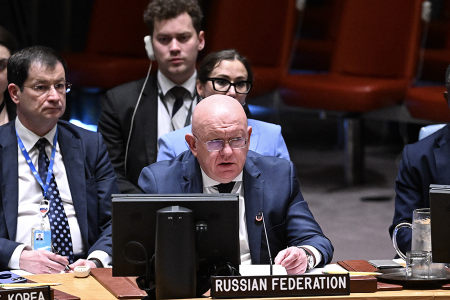Security Council Rejects Second Russian Space Resolution
June 2024
By Shizuka Kuramitsu
For the second consecutive time, the UN Security Council rejected a draft Russian resolution that called on countries to ban all weapons in space, not just weapons of mass destruction.

The vote on May 20 was 7-7, with Switzerland abstaining. It was the same losing tally as when Russia, backed by China, first requested a vote on a similar resolution on April 24. The resolution requires nine votes for adoption.
The back-to-back votes reflect a political duel triggered in February by U.S. allegations that Russia is developing a space-based nuclear anti-satellite (ASAT) capability in violation of the 1967 Outer Space Treaty, which prohibits the deployment of “nuclear weapons or any other kinds of weapons of mass destruction” in space.
Since then, U.S. suspicions about Russian activities have deepened, prompting Mallory Stewart, U.S. assistant secretary of state, to warn on May 3 that the United States will continue using its “diplomatic tools” to raise this issue bilaterally, in the United Nations, and in other multilateral forums “until Russia provides credible assurances that they have ceased these efforts.”
In an effort to discourage the Russian program, Japan and the United States in April proposed a resolution reiterating support for the treaty. But that resolution failed when Russia used its veto to block the measure on April 24. The final vote was 13-1, with China abstaining. (See ACT, May 2024.)
During debate on the May 20 vote, Robert Wood, the U.S. deputy UN ambassador, dismissed the Russian draft resolution as “the culmination of Russia’s campaign of diplomatic gaslighting and dissembling.”
“[O]ver the past several weeks, and following widespread condemnation from a geographically diverse group of member states in the General Assembly…Russia has sought to distract from its dangerous efforts to put a nuclear weapon into orbit,” Wood said.
Russian UN Ambassador Vasily Nebenzia accused states that did not support the Russian draft of favoring “a free hand for the expedited militarization of outer space.”
He emphasized that the Russian draft intended to reaffirm “states’ commitments not to use space for the deployment of any forms of weapons, including weapons of mass destruction,” and said that this “is the language that our American colleagues had refused to include in the text…from the very beginning.”
Russia’s draft was co-sponsored by Belarus, China, Nicaragua, North Korea, and Syria.
Adrian Hauri, Switzerland’s deputy UN ambassador, said his country abstained because “the spirit of flexibility and a framework of trust were lacking” and its suggestions were not taken into consideration despite its support for several elements of the Russian draft.
In her May 3 comments at the Center for Strategic and International Studies, Stewart said that the Russian satellite suspected of carrying components for a potential nuclear ASAT weapon is in “unusual” orbit in “a region of higher radiation than normal lower-earth orbits, but not high enough of a radiation environment to allow accelerated testing of electronics,” which is the scientific purpose of the satellite claimed by Russia.
On May 20, Wood said that another Russian capability, a counterspace weapon, was deployed “into the same orbit as a U.S. government satellite” and it “follows prior Russian satellite launches likely of counterspace systems to low earth orbit in 2019 and 2022.” Pentagon spokesperson Air Force Maj. Gen. Pat Ryder confirmed this assessment May 21 .
Russian officials continued to deny that the country has a new ASAT capability. Deputy Foreign Minister Sergei Ryabkov called the U.S. allegation “fake news” while Kremlin spokesperson Dmitry Peskov said that Russia “act[s] absolutely in accordance with international law, we do not violate anything,” Tass reported on May 22.
Meanwhile, according to Pavel Podvig, a nuclear expert, and The Wall Street Journal, the satellite to which Stewart referred likely is the Cosmos-2553, which was launched Feb. 5, 2022. But Breaking Defense reported on May 22 that “as of yet…no official has publicly named Cosmos-2553 as the satellite in question.”
